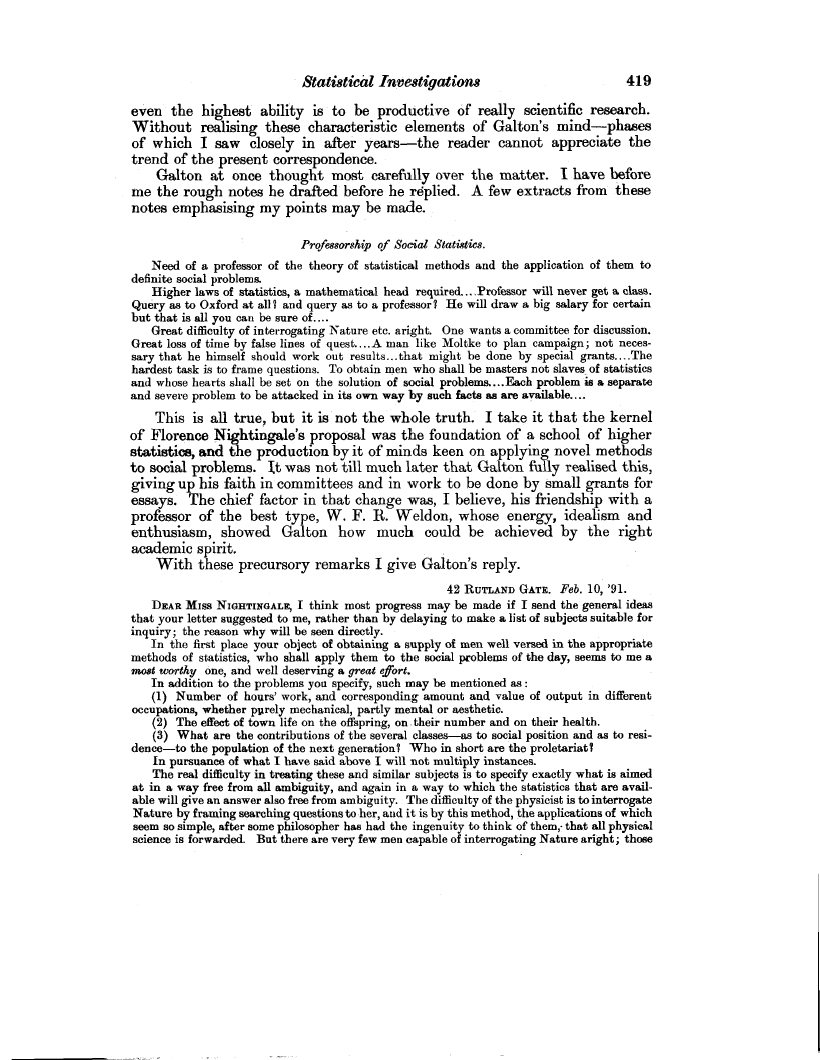Statistical Investigations 419
even the highest ability is to be productive of really scientific research. Without realising these characteristic elements of Galton's mind-phases of which I saw closely in after years-the reader cannot appreciate the trend of the present correspondence.
Galton at once thought most carefully over the matter. I have before me the rough notes he drafted before he replied. A few extracts from these notes emphasising my points may be made.
Professorship of Social Statistics.
Need of a professor of the theory of statistical methods and the application of them to definite social problems.
Higher laws of statistics, a mathematical head required... Professor will never get a class. Query as to Oxford at all? and query as to a professor? He will draw a big salary for certain but that is all you can be sure of....
Great difficulty of interrogating Nature etc. aright. One wants a committee for discussion. Great loss of time by false lines of quest .... A man like Moltke to plan campaign; not necessary that he himself should work out results ... that might be done by special grants... .The hardest task is to frame questions. To obtain men who shall be masters not slaves of statistics and whose hearts shall be set on the solution of social problems .... Each problem is a separate and severe problem to be attacked in its own way by such facts as are available....
This is all true, but it is not the whole truth. I take it that the kernel of Florence Nightingale's proposal was the foundation of a school of higher statistics, and the production by it of minds keen on applying novel methods to social problems. It was not till much later that Galton fully realised this, giving up his faith in committees and in work to be done by small grants for essays. The chief factor in that change was, I believe, his friendship with a professor of the best type, W. F. R. Weldon, whose energy, idealism and enthusiasm, showed Galton how much could be achieved by the right academic spirit.
With these precursory remarks I give Galton's reply.
42 RUTLAND GATE. Feb. 10, '91.
DEAR Miss NIGHTINGALE, I think most progress may be made if I send the general ideas that your letter suggested to me, rather than by delaying to make a list of subjects suitable for inquiry; the reason why will be seen directly.
In the first place your object of obtaining a supply of men well versed in the appropriate methods of statistics, who shall apply them to the social problems of the day, seems to me a most worthy one, and well deserving a great effort.
In addition to the problems you specify, such may be mentioned as
(1) Number of hours' work, and corresponding amount and value of output in different occupations, whether purely mechanical, partly mental or aesthetic.
(2) The effect of town life on the offspring, onn their number and on their health.
(3) What are the contributions of the several classes-as to social position and as to residence-to the population of the next generation? Who in short are the proletariat?
In pursuance of what I have said above I will not multiply instances.
The real difficulty in treating these and similar subjects is to specify exactly what is aimed at in a way free from all ambiguity, and again in a way to which the statistics that are available will give an answer also free from ambiguity. The difficulty of the physicist is to interrogate Nature by framing searching questions to her, and it is by this method, the applications of which seem so simple, after some philosopher has had the ingenuity to think of them,: that all physical science is forwarded. But there are very few men capable of interrogating Nature aright; those

